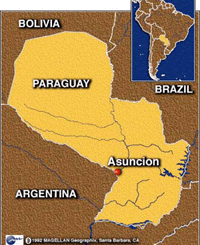The U.S. military is conducting secretive operations in Paraguay and reportedly building a new base there. Human rights groups and military analysts in the region believe trouble is brewing.However, the U.S. embassy in Paraguay denies the base exists and describes the military activity as routine. According to an article in the Bolivian newspaper, El Deber, a U.S. base is being developed in Mariscal Estigarribia, Paraguay, 200 kilometers from the border with Bolivia. The base will permit the landing of large aircraft and is capable of housing up to 16,000 troops. A contingent of 500 U.S. troops arrived in Paraguay on July 1st with planes, weapons, equipment and ammunition. (1)
With Bolivia's recent uprisings, their enormous gas reserves, and a presidential election on the way, this questionable activity could pave the way for a U.S. intervention.Rumors of Al Qaeda training grounds near Paraguay may also work to the Bush administration's advantage as it makes a case for military operations in the region.


